Book contents
- Frontmatter
- Contents
- List of Contributors
- Acknowledgements
- Introduction: Why the Corporation?
- PART I DISCIPLINARY OVERVIEWS
- 1 The Corporation in History
- 2 The Corporation in Legal Studies
- 3 The Corporation in Economics
- 4 The Corporation in Sociology
- 5 The Corporation in Anthropology
- 6 The Corporation in Political Science
- 7 The Corporation in Geography
- 8 The Corporation in Accounting
- 9 The Corporation in Management Studies
- PART II INTERDISCIPLINARY THEMATIC CHAPTERS
- 1 The Evolution of the Corporate Form
- 2 The Multinational Corporate Group
- 3 The Financialization of the Corporation
- 4 Corporate Value Chains
- 5 Corporate Citizenship
- 6 The Corporation and Crime
- 7 The Corporation and Ideology
- 8 Corporation and Communities
- 9 Corporations and Resistance
- 10 Alternatives to the Corporation
- Index
- References
8 - The Corporation in Accounting
from PART I - DISCIPLINARY OVERVIEWS
Published online by Cambridge University Press: 31 March 2017
- Frontmatter
- Contents
- List of Contributors
- Acknowledgements
- Introduction: Why the Corporation?
- PART I DISCIPLINARY OVERVIEWS
- 1 The Corporation in History
- 2 The Corporation in Legal Studies
- 3 The Corporation in Economics
- 4 The Corporation in Sociology
- 5 The Corporation in Anthropology
- 6 The Corporation in Political Science
- 7 The Corporation in Geography
- 8 The Corporation in Accounting
- 9 The Corporation in Management Studies
- PART II INTERDISCIPLINARY THEMATIC CHAPTERS
- 1 The Evolution of the Corporate Form
- 2 The Multinational Corporate Group
- 3 The Financialization of the Corporation
- 4 Corporate Value Chains
- 5 Corporate Citizenship
- 6 The Corporation and Crime
- 7 The Corporation and Ideology
- 8 Corporation and Communities
- 9 Corporations and Resistance
- 10 Alternatives to the Corporation
- Index
- References
Summary
Introduction
In this chapter, we explore accounting and its technologies in terms that attempt to map the ways that accounting technologies have had a constitutive role on the organization and representation of the corporation. Accounting has been and continues to be not merely a technical, professional activity in the service of corporate management, but we argue that accounting (and, latterly, finance) concepts and practices have helped to construct and to shape the very idea of what a corporation is and how it is to be represented materially. At a basic level, for example, accounts prepared for corporate tax purposes configure the corporation along lines close to the corporation as a taxable legal entity. Similarly, published financial accounts, such as the profit and loss account, the balance sheet and fund statements, prepared annually or semi-annually provide aggregate financial information about the corporation as an economic entity that both resembles the legal definition of the corporation and largely defines the rights to the shares of ownership and creditors’ claims.
As we will show, accounting's impact upon the development of the corporation has been profound. In general terms, accounting has shaped many aspects of modern corporate forms via its ability to intervene in the configuration of the corporation as an entity, as well as via its re-representation of corporate activities, using its technical vocabulary and techniques of enumeration and valuation, all captured by the term ‘accounting technologies’. In accounting logic, corporations, large or small, local, national or international, are assumed to be susceptible to ‘representation’ in a set of financial numbers. The very idea of a corporation's continuing claim to existence is an artefact of the assumed stability of the financial accounting statements. In financial reporting, one of the dominant assumptions is the ‘going concern’ (that the corporation will continue operating indefinitely). The longevity of the corporation attested by accounting and auditing calculations is presumed to provide assurances of corporate longevity to all those who interact with the corporation: shareholders, employees, creditors, policy makers, and so on.
- Type
- Chapter
- Information
- The CorporationA Critical, Multi-Disciplinary Handbook, pp. 180 - 196Publisher: Cambridge University PressPrint publication year: 2017



